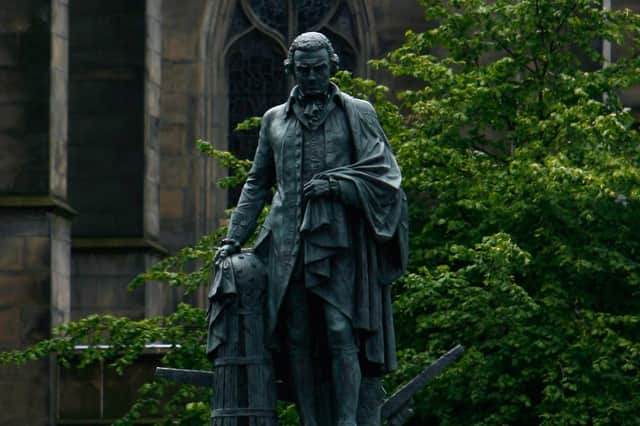Sam Wheldon-Bayes: What would Adam Smith have made of COP26?


Today, as we reflect on COP26, it is fitting to ask what we can learn from Adam Smith, one of the great pioneers of the Enlightenment and a former lecturer at the city’s historic university.
How might Smith have explored the climate emergency?
First Minister Nicola Sturgeon believes that Smith would have supported regulation.
Advertisement
Hide AdAdvertisement
Hide Ad“We cannot know exactly how Smith would have responded to the climate emergency, but given his support for reasonable protections against, for example, abuse of monopolies it seems likely that he would have supported regulation to guard against the destruction of the planet,” she wrote in the foreword to a series of essays reimagining The Wealth of Nations in the 21st century.
Expert authors from three continents have drawn on Smith’s themes to reflect on the climate crisis.
For example, for those who say achieving net zero is too difficult and too expensive, sustainable fund management pioneer David Pitt-Watson hypothesizes what Smith might say.
Ultimately wealth depends on the accumulation of capital to make workers productive – if nature withdraws its capital, no prosperous future can await our children – and the economic gains of the last 250 years will all be lost, he argues.
Former Malaysian Central Banker Dr Zeti Aziz believes a 21st century Smith would be a strong voice and advocate for the protection of the environment, including to the risks that may have intergenerational implications leading to higher overall costs to our planet and humanity.
As we look back on what the Glasgow climate summit did or didn’t achieve, it is worth remembering what is at stake here – the world we leave to future generations.
For us at the Global Ethical Finance Initiative (GEFI), one of the overwhelming takeaways from COP26 was just how important finance and financing nature will be for the journey to net zero.
Research by the World Economic Forum has estimated that an incredible $44 trillion of economic value generation – more than half of the world’s total GDP – is moderately or highly dependent on nature and its services and is therefore exposed to nature loss. Whether you are talking about algae carbon sequestration, women’s empowerment, indigenous land rights or how to create a green jet fuel, much of the conversation in Glasgow was focused on the topic of finance.
Advertisement
Hide AdAdvertisement
Hide AdThe key question is how can we change the financial system to better include nature?
While new public funding pledges were made, in the context of the undelivered $100bn climate finance for poorer countries and the covid pandemic, it is easy to remain sceptical. John Kerry, US Special Presidential Envoy for Climate, highlighted the role of private finance on the first day of the conference, warning that “no government in the world has enough money to fuel this transition as rapidly as we need it but the private sector does”.
While there is disagreement on whether The Glasgow Climate Pact was a success or not, COP26 has demonstrated that it will matter more than ever where we put our money.
Money will be our vote as private citizens, as businesses and as countries. It is the driver and the tool we can use to put pressure on moving things into a higher gear.
Or indeed the thing that will hold us back.
The debate is now one of innovation and transition – namely to the way we include, or continue to exclude, nature from financial accounts, and whether our traditional investment models can accommodate new parameters such as nature, biodiversity loss and social impact.
Despite the recognisable complexity of practical implementation and the interdependency of climate and nature, momentum is building around the critical need for markets to better align to a net zero world.
Although GEFI has been looking at financing nature since 2018, regular COP participants expressed their delight that nature has finally being catapulted up the formal agenda.
This was noted as being a step change in comparison to previous COPs.
Advertisement
Hide AdAdvertisement
Hide AdIt was also evident that the nature conversation has moved beyond a collection of environmentalists, scientists and policy professionals with financial institutions and corporates willing not to only listen and learn but consider the practical steps they must take to address climate change and protect nature and biodiversity.
Another common theme, despite the criticism that this COP was too exclusive and elitist, was that young and indigenous communities are key to solving this crisis and their voices must be heard.
Indeed, some argue that, as those most impacted by climate change today and in the future, they should be leading the conversations. They should not just be in possession of just a seat at the table, but rather the entire table.
The question that echoed around the GEFI HQ during COP26 was: is it all too late?
Having explored the halls of the Blue Zone and Green Zone, as well as hosted an array of events throughout the two weeks in November, we face a dichotomy between those who contend that solving the nature crisis is complex and others convinced that it is pretty simple.
So here too is a lesson from Adam Smith and the Scottish Enlightenment.
The 21st century is once again faced with a period in history where scepticism to authority of all types and the power of reason is in question.
Once again, we are tasked with a simple but powerful challenge: to use evidence, truth and reason to address the greatest problems of our times.
Advertisement
Hide AdAdvertisement
Hide AdThe legacy of COP26 must be to prove that we can rise to the climate challenge.
Sam Wheldon-Bayes is an analyst at the Global Ethical Finance Initiative (GEFI) and editor of The Wealth of Nations in the 21st Century
Comments
Want to join the conversation? Please or to comment on this article.